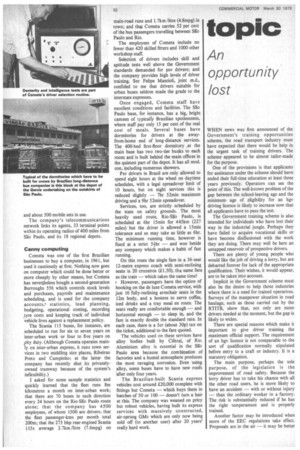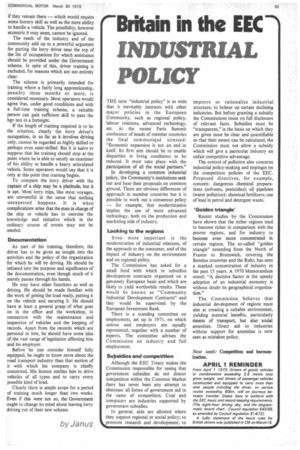topic
Page 52

Page 53

If you've noticed an error in this article please click here to report it so we can fix it.
An opportunity lost
WHEN news was first announced of the Government's training opportunities scheme, the road transport industry must have expected that there would be help in the urgent task of training drivers. The scheme appeared to be almost tailor-made for the purpose.
One of the provisions is that applicants for assistance under the scheme should have ended their full-time education at least three years previously. Operators can see the point of this. The well-known problem of the gap between the school-leaving age and the minimum age of eligibility for an hgv driving licence is likely to increase now that all applicants have to pass the test.
The Government training scheme is also intended for individuals who have lost their way in the industrial jungle. Perhaps they have failed to acquire vocational skills or have become disillusioned with the work they are doing. There may well be here an untapped reservoir of prospective drivers.
There are plenty of young people who would like the job of driving a lorry, but are debarred forever for lack of the appropriate qualification. Their wishes, it would appear, are to be taken into account.
Implicit in the Government scheme must also be the desire to help those industries where there is a need for trained operatives. Surveys of the manpower situation in road haulage, such as those carried out by the RTITB, show that, not only are more drivers needed at the moment, but the gap is likely to widen.
There are special reasons which make it important to give driver training the maximum official support. The requirement of an hgv licence is not comparable to the sort of qualification normally stipulated before entry to a craft or industry. It is a statutory obligation.
The main purpose, perhaps the sole purpose, of the legislation is the improvement of road safety. Because the lorry driver has to take his chance with all the other road users, he is more likely to have an accident — with or without injury — than the ordinary worker in a factory. The risk is substantially reduced if he has the right temperament and is properly trained.
Another factor may be introduced when more of the EEC regulations take effect. Proposals are in the air — it may be better if they remain there — which would require some literary skill as well as the mere ability to handle a vehicle. The possibility, however eccentric it may seem, cannot be ignored.
The needs of the industry and of the community add up to a powerful argument for putting the lorry driver near the top of the list of occupations for which assistance should be provided under the Government scheme. In spite of this, driver training is excluded, for reasons which are not entirely clear.
The scheme is primarily intended for training where a fairly long apprenticeship, possibly three months or more, is considered necessary. Most operators would agree that, under good conditions and with a full-time training scheme, a suitable person can gain sufficient skill to pass the hgv test in a fortnight.
If the length of training required is to be the criterion, clearly the lorry driver's occupation, in so far as it involves driving only, cannot be regarded as highly skilled or perhaps even semi-skilled. But it is naive to suppose that his training should stop at the point where he is able to satisfy an examiner of his ability to handle a heavy articulated vehicle. Some operators would say that it is only at this point that training begins.
To compare the lorry driver with the captain of a ship may be a platitude, but it is apt. Most lorry trips, like most voyages, are uneventful in the sense that nothing unexpected happens. It is when complications arise that the man in charge of the ship or vehicle has to exercise the knowledge and initiative which in the ordinary course of events may not be needed.
Documentation As part of his training, therefore, the driver has to be given an insight into the activities and the policy of the organization for which he will be driving. He should be initiated into the purpose and significance of the documentation, even though much of it merely passes through his hands.
He may have other functions as well as driving. He should be made familiar with the work of getting the load ready, putting it on the vehicle and securing it. He should have at least a general grasp of what goes on in the office and the workshop, in connection with the maintenance and inspection of vehicles and the keeping of records. Apart from the records which are personal to him, he should have some idea of the vast range of legislation affecting him and his employer.
Before he can consider himself fully equipped, he ought to know more about the road transport industry than that section of it with which his company is chiefly concerned. His licence entitles him to drive vehicles of all types and to carry every possible kind of load.
Clearly there is ample scope for a period of training much longer than two weeks. Even if this were not so, the Government ought to change its mind about leaving lorry driving out of their new scheme.
by Janus










































































































